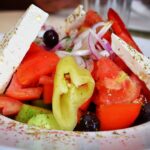You may have heard all about the positive health benefits of the Mediterranean diet, but no one has really been brave enough to ask, does this diet plan have any weaknesses? Well, today we will explore the pros and cons of the Mediterranean diet without prejudice or bias.
There are lots of trendy diets out there, but only one has stood the test of time and the reason for it surviving all the criticisms, competition and attempted dethroning is due to having a ton of science-backed proof of its health benefits. It’s called the Mediterranean diet and this is why places surrounding the Mediterranean Sea basin are considered “Blue Zones” – meaning they are places where the healthiest and longest living people are found.
Ask nearly any nutrition expert and they’ll tell you, the Mediterranean diet is one of the healthiest diets on the planet—if not the healthiest. With strong emphasis on super healthy and naturally-sourced food like vegetables, fruits, whole grains, nuts, legumes, healthy fats (especially olive oil), fish, and moderate amounts of dairy, poultry, and red wine, there’s virtually no health risk associated with this diet. It also limits red meat, added sugar, refined carbs, and anything highly processed.
But let’s not get ahead of ourselves and delve deep into this diet in order to find out if it has any weaknesses. I’ve compiled all the pros and cons of the Mediterranean diet for your consideration.
What is the Mediterranean Diet?
The Mediterranean diet, much like the flexitarian and pescatarian diets, is generally plant-based. It’s also a non-restrictive diet and commonly includes foods like:
- All fruits (fresh, frozen, dried)
- All vegetables (fresh, frozen, dried, canned)
- Whole grains (brown rice, pasta, bread, cereals, oats)
- Legumes (lentils, beans, chickpeas, peas, soy)
- Nuts and seeds (e.g., chia, pumpkin, sesame seeds, macadamia, almonds, cashews, hazelnuts, walnuts, peanuts, pistachios, pine seeds)
- Herbs and spices (e.g., pepper, oregano, basil, rosemary, bay leaf, cumin)
- Olive oil and other vegetable oils (sesame, walnut, canola, avocado oil)
- Fish and seafood (at least twice a week; fatty fish like salmon, mackerel, and sardines are recommended)
- Poultry and eggs (small portions a few times weekly; white poultry meat is preferred)
- Low-fat dairy foods (small portions a few times a week)
- Lean red meat (limited to a few times per month)
Things to know when you want to adhere to this diet:
- Choose unsaturated healthy fats over saturated fats. This means using olive, sesame, avocado, soybean, canola, safflower, and flaxseed oils in place of butter, margarine, shortening, animal fat, coconut, palm, and cocoa oil.
- Fish and legumes are preferred sources of protein, followed by poultry and lean meats.
- Moderate consumption of wine (up to 1 glass for women and up to 2 glasses for men) is allowed, although water is the primary beverage in a typical Mediterranean diet.
- Processed foods, beverages, and food products high in refined sugars, saturated fats, trans fats, and sodium should be limited.
- Incorporate regular physical activity into your lifestyle (including walking, dancing, jogging, yoga, cardio, etc.)
Here are the Pros and Cons of the Mediterranean Diet
I thought that it would be prudent to present the Mediterranean diet with its good and bad sides, so you can decide whether or not this diet is for you. Look for the pros and cons of the Mediterranean diet below.
Pros
Easy Adherence
The best thing about the Mediterranean diet is that it’s relatively easy to follow. While it may recommend a lot of healthy foods, it doesn’t exclude or restrict any food groups, making it a sustainable diet plan with lots of health benefits. Fad diets occasionally force you to give up on some of your favorite foods; however, in the Med diet it may be okay to include them in your meals, albeit in moderation, of course.
Nutrition
Due to the non-restrictive and inclusive nature of this diet, it allows people to have balanced consumption of all food groups, encouraging intake of whole foods, high-quality protein, healthy fats, antioxidants, and dietary fiber. This essentially makes the Mediterranean diet highly nutritious because it emphasizes the consumption of nutrient-rich foods. This also reduces the risk of related nutrient deficiencies and malnutrition, which are common for other more restrictive diets, like keto and vegan diets.
Are you starting to like the pros and cons of the Mediterranean diet now? Well, there’s more! Keep reading to find out.
Health Benefits
There are a lot of science-backed evidence on why the Mediterranean diet offers multiple health benefits to adults, adolescents, and children:
- Lower blood pressure
- Give you a balanced HDL and LDL cholesterol profile
- Lowers risk of type 2 diabetes
- Lowers risk of metabolic-related health conditions
- Risk of developing depression, cognitive decline, and Alzheimer’s disease are also reduced
- Lowers risk of heart disease and stroke
- Blood sugar is kept at optimal levels
- Lowers BMI and improves weight loss
You Might Lose Some Weight
The Mediterranean diet was not planned by the people living around the Mediterranean Sea, instead they were forced to adapt to the available consumable resources in that region, which incidentally also became the world’s best diet. But an interesting thing happened which also became its byproduct – weight loss. According to an article published in Nutrients in 2019, weight loss, lower body mass index and lower waist circumference is a factual result of adhering to this diet, even though the process is gradual and slow (as we’ve already stated, the diet was not created for this purposes but was developed due to scarce food resources and these are merely byproducts of the diet). You’ll be glad that you get these types of health benefits when dissecting the pros and cons of the Mediterranean diet.
Recommended Reading: Mediterranean Diet Cooking Ideas
Your Brain Will Probably Thank You
In a 2019 study that was published in Diabetes Care, it showed that the Mediterranean diet helped almost 1,500 people (which the research monitored for 2 years) manage their type 2 diabetes and even had better cognitive function than those who followed different diet plans. Furthermore, the researchers also noted that the diet also helped improve the memory function among adults without diabetes.
Meanwhile, in another study published in Alzheimer’s and Dementia, it showed that most of the 8,000 individuals who participated in the study – who had excellent health and particularly without age-related macular degeneration – had reduced risk of cognitive impairment when they adhered to the Mediterranean diet. However, these preliminary conclusions are to be taken with a grain of salt because the study was done at the population level. Therefore, the individual effects of this findings will not be significant.
Another study published in the journal, Gut, just recently in February 2020 which concluded that adults above 50 years old who follow the Mediterranean diet are less likely to develop advance of cognitive decline and frailty. Because this diet helps improve “good” gut bacteria and reduce inflammation, it promotes healthy aging, as per the study’s findings. It seems that people have more to gain than lose in the pros and cons of the Mediterranean diet.
It May Tamp Down Inflammation
Medical scientists have long since known that inflammation is the body’s way to not only react to, but also heal and repair itself from illness or injury. But persistent, low-grade inflammation can be dangerous. Inflammation is caused by many factors, from stress to inactivity, and it can also increase your risk of developing health conditions like heart disease, diabetes and cancer.
Thankfully, a lot of research today supports how the Mediterranean diet helps reduce chronic inflammation with science-backed data. True enough this diet has lots of anti-inflammatory foods like antioxidant-rich fruits and vegetables (e.g. tomatoes and leafy greens), as well as olive oil, nuts and fish.
You May Reap Heart-Healthy Benefits
When there are more than 300 elderly people who are at least 100 years old in the island of Sardinia, Italy tell you that they consume Mediterranean diet foods, you better believe it that they have very rarely any chronic diseases – including CVD (cardiovascular diseases)! Scientists had these centenarians undergo cardiogram examinations and found that their hearts were that of someone 20 years younger than their actual age. Scientists concluded that this amazing heart health that the Mediterranean people achieved was due to a large percentage of fat in the Mediterranean diet is monounsaturated, from olive oil, which does not raise cholesterol levels the way saturated and trans fats do.
Now we’re starting to doubt whether we ought to be talking about the pros and cons of the Mediterranean diet, when it is obvious that the diet seems to only have health benefits and almost no disadvantages.
An April 2020 study in the Journal of the American College of Cardiology has proven this hypothesis and they stated (based on clinical data) that consuming at least 1/2 tablespoon of olive oil a day is associated with a lower risk of cardiovascular disease, whereas animal-based fats like butter does the opposite. This was the first study of its kind, where it evaluated over 90,000 Americans in the span of 24 years! Another study in the same month of April 2020 published in the BMJ released a meta-analysis that reviewed 121 randomized trials and revealed that the Med diet lowered the risk factors in CVD such as high blood pressure and cholesterol. Furthermore, it was compared with other diets and it was the only one that has consistently improved these factors even at the end of the 12-month study.
And even better is that omega 3 is also abundant in the Mediterranean diet, as fish and other seafood is a staple in this diet. Omega 3 is known to lower triglycerides and larger HDL cholesterol particles, which are responsible for plaque buildup and heart disease. This is stated in a February 2020 study of 26,034 healthy people assigned female at birth in JAHA. As far as the pros and cons of the Mediterranean diet is concerned, this information further solidifies the health benefits of this amazing diet.
The Foods Are Budget-Friendly
Contrary to popular belief, the Mediterranean diet is actually not expensive. In fact, if you go to the fishing villages and farms of the Mediterranean people, you will see that this diet is mostly consumed by poor and average people. You go to the market right now and check if anyone will sell you vegetables, such as onions, carrots, tomatoes and cucumbers for $100-a-piece! Obviously that would be insanity because these food ingredients are available in abundant amounts practically everywhere on the planet. Beans, legumes, pasta and cheese are also relatively inexpensive and widely available at most grocery stores (these are basic ingredients in the Med diet).
Perhaps the only expensive item in the Mediterranean diet is the extra-virgin olive oil (EVOO), which is typically more expensive than butter.
Meal Planning for the Mediterranean Diet
When preparing meals based on the Mediterranean diet it’s good to include fiber-rich vegetables. A good example would be a side salad, additional veggies to your pasta sauce, or stir-fry vegetable mix. While this is technically a part of the pros and cons of the Mediterranean diet, it is important to learn about it.
- Let’s start with the most important nutrient for the day, protein! Soy products like tofu and tempeh, poultry, fish, legumes, or other plant foods are rich in protein, so add them to your meal accordingly.
- Prioritize cooking methods like boiling, baking, roasting, steaming, poaching, sauteing, stir-frying and air frying instead of deep frying. These cooking methods will make you less likely use animal-based fat and non-olive oil fat sources, which makes you consume unnecessary calories.
- Use only healthy unsaturated cooking oils like extra virgin olive oil (EVOO), actually use only olive oil because that’s what the Med people use.
- Prepare diverse meals and use a wide variety of whole foods to achieve variety in your diet.
- Prioritize home cooked meals instead of eating out, because you have full control over which ingredients to use in your meals and how much of them you need to use. That being said, if you really want to enjoy eating out with friends, then choose restaurants with Mediterranean diet-friendly menu such as Avalon Pockets!
Cons
Eating Too Much
And now we’ll discuss the disadvantages of the Med diet in this “pros and cons of the Mediterranean diet” article. The fact that this diet does not restrict food groups nor be strict about the amount of food you consume (although they do recommend to people to eat in moderation) is the most irritating thing about it. It goes without saying that there are some people who adhere to the diet have difficulty moderating portion sizes or eating mindfully. Not eating in moderation would have the same effect as when you were in your regular diet prior to following this diet plan.
The Advice from Claudia Hleap (Registered Dietitian)
According to Claudia, she is most impressed with the Mediterranean Diet for obvious reasons. It gives people the opportunity to make healthy food choices, is diet is evidence-based and promotes a healthy relationship with food. Nearly all who adhere to it have shown improvements in various aspects of their health, including their weight, blood sugar, blood pressure, and cholesterol management.
But she does have some issues about it also and among them are:
The ‘Rules’ Are Somewhat Vague
When talking about the pros and cons of the Mediterranean diet, it’s hard to overlook one disadvantage that it has – it has no rulebook or strict eating code, or something that resembles a solid eating guide for people to follow. This, of course, results in people not holding back in serving portions in their meals and in some cases, confuses them.
For example, the diet uses words such as “low to moderate intake,” “abundance” and “often,” which are fairly open to interpretation.
Specific parameters regarding total calorie count and physical activity are also not straightforward, which leaves patrons of this diet (especially the new ones) are clueless.
You Still Need to Talk to Your Doctor
While it’s true that there are plenty of research that supports the health benefits of this diet, which is the root argument of the pros and cons of the Mediterranean diet; however, you need to make a few considerations, especially if you have certain health conditions that would get worse due to the type of food that you’re eating, including the Mediterranean diet.
- If you don’t watch out for those pasta, bread and pastries, you could end up with having a high blood sugar than you bargained for and that’s not good if you have type 2 diabetes.
- You are also encouraged to drink at least a glass of wine when following this diet, which can be hazardous for some people who have chronic illnesses and are taking maintenance medication.
- For people who are at high risk of heart attack or stroke and are recommended by their doctors to take blood thinners may want to think twice in adhering to the Mediterranean diet. The reason behind this is because certain blood thinners are very sensitive to vitamin K levels in the diet, and those levels can vary dramatically based on plant intake. While it’s true that the diet basically improves heart health, it may not be useful at this point in the lives of these folks as they’ve already developed CVD (cardiovascular disease) and are essentially in danger that they require medical assistance, and if necessary, have to be monitored for any changes in their blood viscosity.
The Bottom Line
Now that we’ve arrived at the end of our discussion about the pros and cons of the Mediterranean diet, clearly the pros outweigh the cons! But all the same, some of the cons need to be taken into consideration also. The Mediterranean diet is based on listing foods to prioritize in the diet and which to limit, therefore, not completely restricting any foods from the diet. This way, you can still enjoy all the foods you love while practicing balancing out your plate and eating in moderation.








One Response
Your post is very helpful and the information is reliable. I am satisfied with your post. Thank you so much for sharing this wonderful post. Good Work! best of luck with the next one
Thanks!